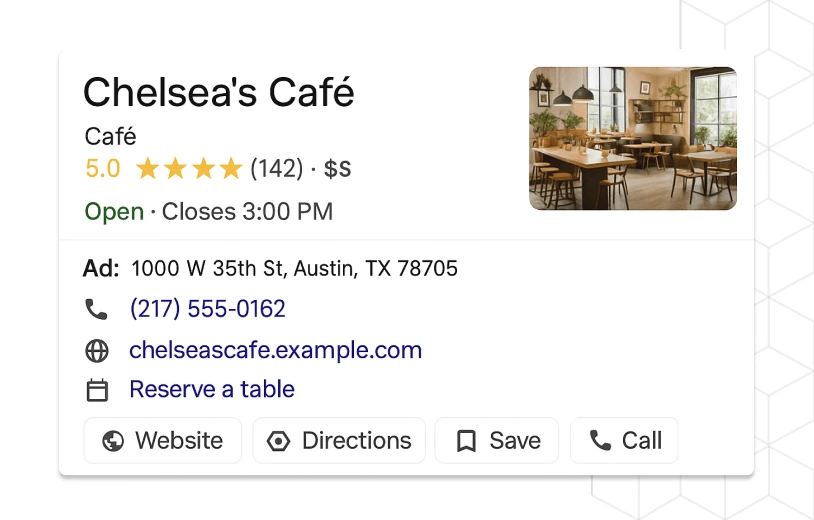Key Takeaways
- Local SEO is crucial for enterprises to increase visibility in local markets and drive foot traffic.
- Key components of local SEO include GBP optimization, local citations, on-page optimization, local link building, and local content marketing.
- Enterprises face unique challenges in local SEO, such as managing multiple locations and maintaining brand consistency.
- Strategies for success include centralized management systems, standardized processes, local SEO audits, and partnering with a local SEO company.
- Effective local SEO enhances trust, provides a competitive advantage, and supports national SEO efforts.
- “Near me” searches are a significant driver of local business.
Would you like to know the real power behind data-driven PPC campaigns?
Small eCommerce businesses are turning $500 PPC investments into $2,000 in sales. That’s a 300% ROI that proves the value of strategic digital advertising.
Success with PPC demands more than launching ads and crossing fingers. Savvy marketers know that data sits at the heart of every high-performing campaign. This methodical approach helps you pinpoint ideal audiences, optimize budget allocation, and measure true campaign impact.
Your PPC campaign success relies on four essential metrics:
- Cost Per Acquisition (CPA) – The actual cost to acquire a customer. Lowering CPA while maintaining quality leads is key to profitability.
- Conversion Rate (CVR) – Measures how effectively clicks turn into valuable actions, such as purchases or sign-ups.
- Return on Ad Spend (ROAS) – Evaluates how much revenue you generate for every dollar spent, making it a critical KPI for eCommerce and sales-driven businesses.
- Quality Score & Ad Relevance – Ensures that you receive the best possible CPC for high-intent traffic, influencing both ad placement and cost.
- Customer Lifetime Value (CLV) – Helps justify higher CPC if long-term value outweighs upfront costs.
These metrics create the foundation for ROI-focused decisions that drive real business growth.
Are you ready to unlock the full potential of your PPC campaigns? Let’s explore proven PPC marketing services that turn casual clicks into valuable conversions through data-backed decision-making.
Why Local SEO Matters for Enterprise Businesses

While national and global SEO strategies are important for enterprise businesses, local SEO plays a vital role in driving growth and achieving specific business objectives:
Increased Visibility in Local Markets
Local SEO helps businesses appear prominently in local search results, including Google’s Local Pack and Google Maps. This increased visibility ensures that potential customers searching for products or services in a specific area can easily find your business.
“Near me” searches have become increasingly prevalent, with consumers using them to find businesses in real-time. There are almost 800 million ‘near me’ searches every month, and 46% of all Google searches have local intent.
To understand why local SEO is so critical, it’s important to know that Google uses two primary, yet interconnected, algorithms:
- The local algorithm: This algorithm determines rankings in the Map Pack (the set of local business listings that often appears at the top of search results) and relies heavily on factors like the accuracy and completeness of structured business listings (Name, Address, Phone Number – NAP), local reviews, and various location signals.
- The core organic algorithm: This algorithm is what most people think of when they consider SEO. It indexes website pages and ranks them based on broader relevance and authority criteria, considering factors like backlinks, content quality, and website structure.
For enterprises with multiple locations, optimizing each location’s online presence is crucial to capture this local search traffic. A strong local SEO strategy ensures that each branch or outlet appears in relevant local searches, driving visibility not only in organic results but also in the coveted Local Pack.
Driving Foot Traffic and In-Store Sales
For enterprises with physical stores or offices, local SEO is a powerful driver of foot traffic and in-store sales. By optimizing for local searches, businesses can attract customers who are actively seeking their offerings in the immediate vicinity.
This is particularly important in competitive markets where consumers have many choices.
Building Trust and Credibility
Local SEO signals, such as a well-optimized Google Business Profile, positive customer reviews, and consistent local citations, enhance trust and credibility with local customers. When a business appears consistently across various online platforms with accurate information, it instills confidence in potential customers.
Competitive Advantage
Effective local SEO can provide a significant competitive advantage, even against smaller, local businesses. Enterprises with a strong local SEO strategy can dominate local search results, attracting a larger local market share.
This is especially crucial in competitive markets like Austin.
Supporting National SEO Efforts
Local SEO complements broader SEO strategies by improving online visibility and domain authority. Strong local SEO signals can positively influence national search rankings and contribute to a more robust online presence.
Key Components of Local SEO for Enterprises

Successful local SEO for enterprises involves a combination of several key components. Here’s a suggested prioritization and timeline for implementation, along with considerations for different types of enterprises:
Phase 1: Foundational Optimization
Google Business Profile (GBP) Optimization
- NAP Consistency: Ensuring accurate and consistent Name, Address, and Phone Number (NAP) information across all online platforms is fundamental. Inconsistencies can confuse search engines and negatively impact local search rankings.
- Category Selection: Choosing the most relevant categories for your business within GBP is crucial for helping Google understand your offerings and match you with relevant searches.
- Reviews and Reputation Management: Encouraging and managing customer reviews is essential. Positive reviews enhance credibility, while responding to negative reviews demonstrates customer service and can mitigate potential damage.
- GBP Posts and Q&A: Utilizing GBP Posts to share updates, promotions, and events, and actively engaging with the Q&A section, can improve visibility and customer engagement.
GBP optimization is best for all enterprises, especially brick-and-mortar locations. This should be the first priority, as GBP is the cornerstone of local SEO.
Local Citations
- Definition: Local citations are online mentions of your business’s NAP information. They appear in online directories, business listings, and other websites.
- Consistency: Citation consistency is vital. Ensure your NAP information is identical across all platforms.
- Citation Building: Strategically building citations on reputable and relevant platforms can improve local search rankings.
Local citations are best for all enterprises, but essential for businesses seeking to establish a strong local presence. Implement this concurrently with GBP optimization, focusing on core directories initially.
Phase 2: Content and Engagement
On-Page Optimization for Local
- Location Pages: For enterprises with multiple locations, creating dedicated location pages on your website is essential. These pages should include specific details about each location, such as address, hours, directions, and unique local content.
- Schema Markup: Implementing schema markup (structured data) helps search engines understand the content on your website, including local business information.
- Local Keywords: Incorporating relevant local keywords into your website content, such as city names, neighborhoods, and local landmarks, can improve local search rankings.
- Mobile Optimization: Ensuring your website is mobile-friendly is crucial, as many local searches are conducted on mobile devices.
This is best for all enterprises, but crucial for those with a website. Begin on-page optimization once GBP and core citations are in place. It’s an ongoing process.
Reviews and Reputation Management
- Encouraging and managing customer reviews is essential. Positive reviews enhance credibility, while responding to negative reviews demonstrates customer service and can mitigate potential damage.
- GBP Posts and Q&A: Utilizing GBP Posts to share updates, promotions, and events, and actively engaging with the Q&A section, can improve visibility and customer engagement.
This is best for all enterprises, but essential for building trust and driving conversions. This is also an ongoing, continuous effort.
Phase 3: Advanced Strategies
Local Link Building
- Importance: Building high-quality links from other local websites can significantly boost your local SEO.
- Strategies: Strategies include acquiring links from local organizations, chambers of commerce, community websites, and local directories.
Local link building is great for enterprises looking to increase authority and outrank competitors. This is an ongoing process, with a focus on quality over quantity.
Local Content Marketing
Creating content that resonates with the local audience can attract more customers. This includes blog posts about local events, community involvement, local partnerships, and local news.
This is best for enterprises looking to build long-term relationships and brand awareness in the community. As an ongoing process, integrate this into your marketing strategy.
Challenges of Local SEO for Enterprises
Enterprises face unique challenges in implementing effective local SEO strategies:
Managing Multiple Locations
Maintaining consistency and accuracy across numerous GBP listings, location pages, and citations can be complex and time-consuming. This challenge is amplified by several factors:
- Friction between local franchisee updates and corporate oversight: Local managers may make changes to GBP listings without informing the corporate office, leading to inconsistencies.
- Challenges with syncing CMS systems and CRMs for location pages: Integrating various software systems to ensure consistent information across all online touchpoints can be technically complex.
- Legal or regulatory hurdles for public companies claiming GBP listings across regions: Public companies may face legal restrictions or reporting requirements when managing and updating their local listings.
Brand Consistency and Reporting
- Ensuring consistent branding across all local presences is crucial for maintaining a unified brand image.
- Tracking local SEO performance across multiple locations and attributing local SEO efforts to business outcomes can be challenging.
Strategies for Overcoming Challenges and Maximizing Local SEO

To overcome these challenges and maximize local SEO effectiveness, enterprises can implement the following strategies:
- Centralized Management Systems: Utilize tools and platforms to manage GBP listings, citations, and location data at scale, ensuring consistency and accuracy.
- Standardized Processes: Implement standardized processes for updating information, responding to reviews, and creating local content, streamlining local SEO efforts.
- Local SEO Audits: Conduct regular local SEO audits to identify areas for improvement and track progress.
Working with a Local SEO Company
Partnering with a local SEO company that specializes in enterprise-level local SEO can provide significant benefits. A local SEO company near me will have in-depth knowledge of the local market and the expertise to develop and execute effective strategies.
For businesses seeking local SEO optimization, a dedicated Austin SEO agency can be invaluable.

Dominate Your Local Market with Expert SEO
Stop leaving local customers to your competitors. Fahrenheit Marketing delivers enterprise-level local SEO strategies that drive real results.
Request a free local SEO audit and uncover opportunities to improve your local search rankings and online visibility.
